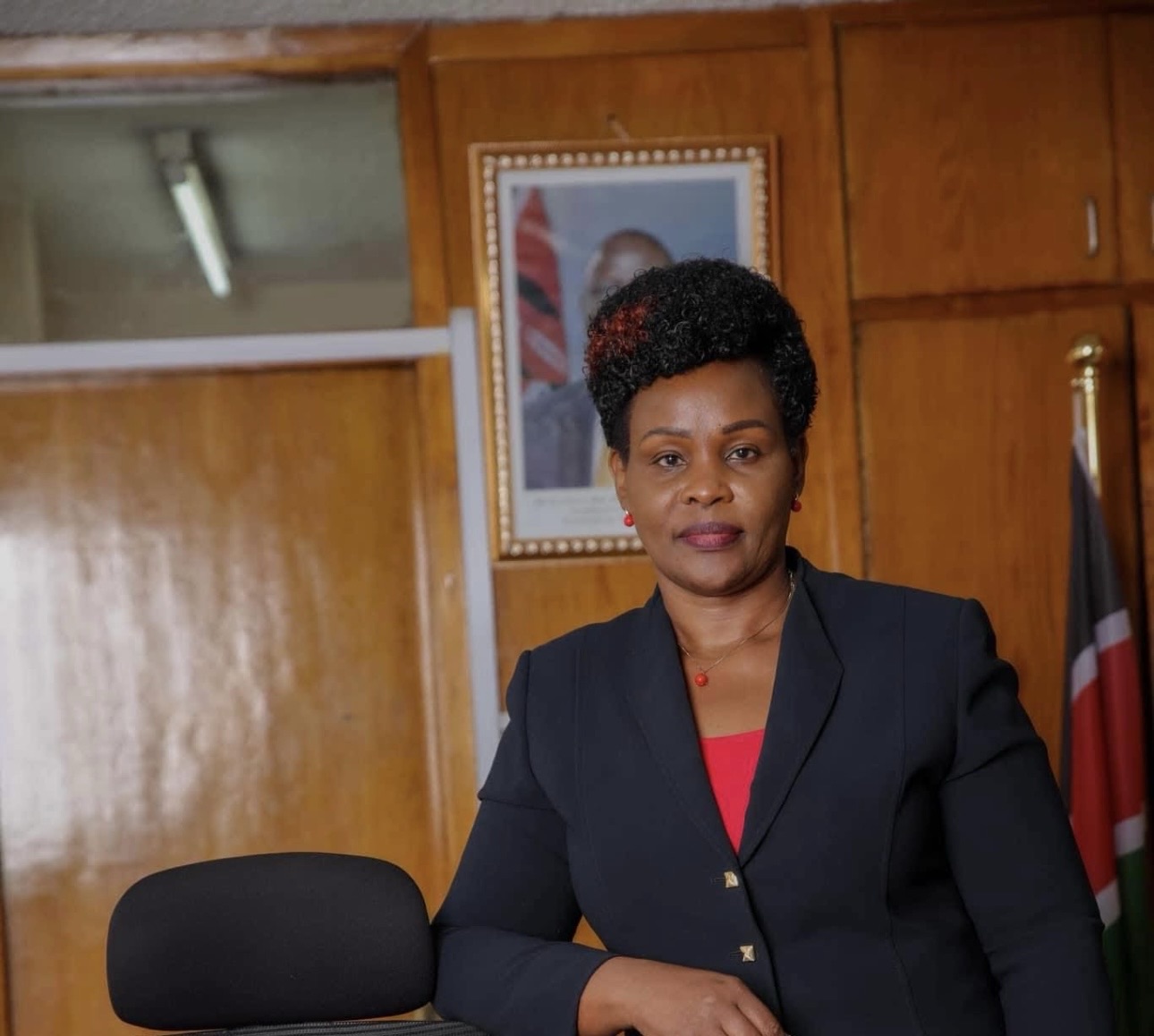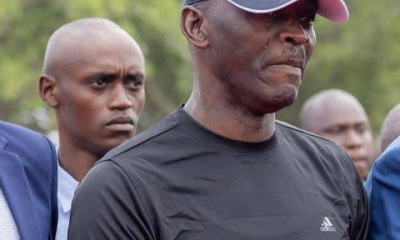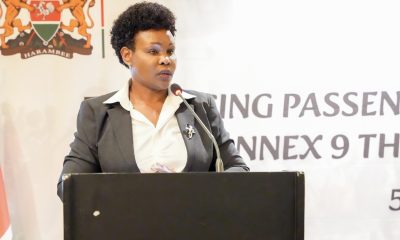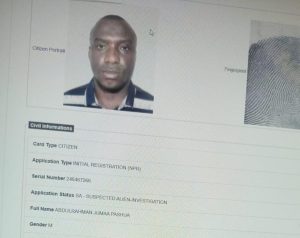Investigations
VISA CARTEL EXPOSED: Community Leaders Demand Immediate Arrests as Immigration Boss Allegedly Boasts of Weekly Political Kickbacks
Her field general is Abdulrahman Pashua Juma, the Mombasa-based fixer who controls visa processing through secret channels, charges applicants USD 175 to 200 per visa, and sends only the official USD 34 fee to government coffers while splitting the rest with his network.

New Bombshell Allegations Reveal Director General’s Shocking Claims About “Campaign Contributions” While Cartel Continues Bleeding Applicants Dry
By Kenya Insights Investigative Desk
NAIROBI, Kenya – The visa corruption scandal rocking Kenya’s Immigration Department has taken an even more explosive turn as community leaders reveal that Director General Evelyne Cheluget allegedly bragged to visitors about collecting KES 4 million every weekend for “government campaigning,” while the criminal network she oversees continues to extort desperate visa applicants with complete impunity.
In a devastating new complaint sent directly to Cheluget herself, along with the Principal Secretary of Interior, the Director of Criminal Investigations, and the Ethics and Anti-Corruption Commission, the Somali Community Task Group on Immigration Transparency has pulled back the curtain on what they describe as a full-scale state robbery operation masquerading as public service.
THE WEEKEND MONEY MACHINE
According to multiple witnesses who visited the Director General’s office, Cheluget allegedly made a stunning admission that should trigger immediate criminal investigations.
“This visa issue started before me. I have a target for government campaigning, and I contribute KES 4 million every weekend to the government,” she allegedly told shocked community members seeking answers about the extortionate fees being charged for visa processing.
If true, this statement represents perhaps the most brazen admission of corruption ever attributed to a sitting Kenyan government official. It suggests that visa processing, a sovereign government function meant to serve national security and facilitate legitimate travel, has been weaponized as a political fundraising machine.
The math is staggering and the implications terrifying.
At KES 4 million per weekend, that’s roughly KES 16 million per month allegedly being funneled into political coffers. In a year, that’s nearly KES 200 million extracted from desperate visa applicants and channeled into campaign war chests.
But here’s where the alleged scam gets even more diabolical. Community sources claim that when politicians later demand their KES 10 million share, Cheluget allegedly sends brokers to pay them a paltry KES 20,000 each while pocketing the millions herself.
This isn’t just corruption. This is organized crime hiding behind government letterhead.
THE CARTEL’S COMMAND STRUCTURE REVEALED
The new complaint provides the most detailed organizational chart yet of what investigators are now calling a criminal enterprise operating within Kenya’s immigration infrastructure.
At the apex sits Evelyne Cheluget, described as the mastermind and money collector who commands officers and brokers like personal staff, collects millions monthly through fake targets, and uses the system to reward corrupt officers while silencing whistleblowers.
Her field general is Abdulrahman Pashua Juma, the Mombasa-based fixer who controls visa processing through secret channels, charges applicants USD 175 to 200 per visa, and sends only the official USD 34 fee to government coffers while splitting the rest with his network.
Abdiaziz Ibrahim serves as the Eastleigh kingpin, handling money and passports from brokers across the community and forwarding everything to Pashua for processing.
Mohamed Salah Igge, operating from Al-Kowther Mall in Eastleigh, functions as the money mover and network handler, ensuring cash flows smoothly from agents in Nairobi to Mombasa and back to Nyayo House.
Shem Ateka, the National Intelligence Service officer previously identified, provides security and intelligence protection inside Nyayo House, ensuring no arrests or internal disruption of the cartel’s operations.
John Ndegwa serves as the approval manipulator, signing off on cartel-controlled visas to give them the veneer of legitimacy.
Supporting this core network are sub-agents Mubashir Omar, Abdirahman Ali, Abukar Dhaqane, and Amish, who work between Nairobi and Mogadishu sending bulk applications through the cartel’s channels.
This isn’t a few rogue officers taking bribes. This is a sophisticated criminal organization with defined roles, secure communications, money laundering operations, and high-level political protection.
HOW THE THEFT MACHINE OPERATES
The mechanics of the scam are brutally simple and devastatingly effective.
An applicant, often a Somali refugee, diaspora member, or foreign national seeking legitimate entry to Kenya, approaches one of the cartel’s many agents scattered across Eastleigh, Mombasa, and even Mogadishu.
They’re told the visa will cost USD 175 to 200. They have no choice. Independent agents have been locked out of the system. Legitimate channels have been closed. It’s the cartel or nothing.
The applicant pays. The agent collects the passport and forwards it up the chain. Only USD 34, the official government fee, gets entered into the system. The remaining USD 141 to 166 vanishes into the network.
That difference gets carved up like a Mafia tribute system. Cheluget takes the biggest cut as the protection boss. Pashua Juma takes his main share as the operations chief. Ibrahim and Igge get their field commissions. Ateka and Ndegwa receive their protection money for keeping the system running smoothly from inside Nyayo House.
With over 1,200 applications per week flowing through this pipeline, the cartel is extracting roughly USD 170,000 to 200,000 weekly from desperate applicants. That’s close to USD 800,000 per month, or nearly USD 10 million annually.
And remember, this is just one department in one government ministry. If this model has been replicated elsewhere, Kenya could be hemorrhaging hundreds of millions of shillings annually to internal criminal networks.
THE POLITICAL PROTECTION RACKET
The alleged claim about weekend political contributions adds a chilling dimension to this scandal that goes far beyond ordinary corruption.
If immigration revenues are being diverted to political campaigns, it suggests that elected officials or political parties may have a direct financial interest in maintaining the cartel’s operations. It means that any attempt to reform the system threatens not just the corrupt officers but their political patrons.
This creates a protection racket of terrifying effectiveness. Whistleblowers aren’t just fighting corrupt immigration officers. They’re fighting against political machines that depend on this money to fund campaigns, pay operatives, and maintain power.
It explains why previous complaints have gone nowhere. It explains the deafening silence from oversight bodies. It explains why officers who refused to cooperate were stripped of system access while compliant officers were rewarded.
The cartel isn’t just protected by corrupt officials. It’s protected by the entire political food chain that feeds on its proceeds.
A COMMUNITY DECLARES WAR
The tone of this latest complaint marks a dramatic escalation in the Somali community’s fight against the cartel.
“No more lies. No more cover-ups. No more selling Kenya’s dignity to corrupt officers,” the complaint declares with barely contained fury.
The community is demanding immediate action from the DCI, EACC, the Parliamentary Committee on Immigration, and the Office of the President. They want accounts frozen. They want arrests made. They want every name brought to justice.
Most significantly, they’re demanding a response within 14 days. This isn’t a vague complaint hoping for eventual action. This is an ultimatum backed by evidence and witnesses.
The complaint’s language reflects the rage of a community that has been exploited, insulted, and discriminated against for too long. “The Somali community and all honest travel agents say ENOUGH! We will not be silenced. We will expose every name, every payment, and every fraud.”
They’re even directly challenging the Director General’s alleged statement, calling it “extremely alarming” and demanding immediate investigation and public clarification. They’re essentially calling her bluff, daring her to either prove the statement was misunderstood or face the consequences of having admitted to criminal activity.
THE EVIDENCE TRAIL GROWS
What makes this latest complaint particularly dangerous for the accused officials is that it comes with specific details that can be verified or disproven.
The complainants reference “several individuals who visited your office” who heard Cheluget’s alleged statement. These are named witnesses who can be interviewed under oath.
They provide specific locations where cartel operations occur, including Al-Kowther Mall in Eastleigh, which can be placed under surveillance.
They describe money flows that leave paper trails through M-Pesa, bank transfers, and Western Union transactions that forensic accountants can trace.
They identify specific officers whose email logs, PISCES system access records, and approval histories can be audited to prove or disprove the allegations.
Most damning, the complaint references photographs and documentation sent with previous submissions. These aren’t vague accusations. These are evidence-backed allegations that demand investigation.
THE INSTITUTIONAL CRISIS
What this scandal reveals goes far beyond one corrupt department or one criminal network. It exposes a systemic institutional failure that threatens Kenya’s entire governance structure.
How does a Director General openly brag about collecting millions for political campaigns without triggering immediate investigation? How does a criminal cartel operate for months inside a supposedly secure government facility like Nyayo House without being detected?
Where are the internal audits? Where are the system access logs that should flag suspicious patterns? Where are the financial intelligence reports that should detect unusual money flows? Where are the parliamentary oversight committees that should be grilling officials?
The answer is as obvious as it is depressing. The oversight systems either don’t exist, don’t function, or have been captured by the same interests they’re supposed to police.
Kenya has built an impressive architecture of anti-corruption institutions over the past two decades. We have the EACC, the DCI, parliamentary committees, ombudsman offices, and countless laws and regulations. Yet none of it prevented this cartel from flourishing in plain sight.
That institutional paralysis represents perhaps the greatest threat to Kenya’s development. If citizens cannot trust that government will investigate obvious corruption, if whistleblowers cannot rely on protection, if evidence doesn’t lead to arrests, then the entire social contract collapses.
INTERNATIONAL IMPLICATIONS INTENSIFY
The fact that this latest complaint was copied to the Office of the Attorney General signals that community leaders are preparing for possible legal action if administrative remedies fail.
The previous complaint was already sent to the U.S. Embassy and UN Anti-Corruption Office. This escalating international attention should terrify Kenyan officials who care about the country’s reputation.
Kenya positions itself as East Africa’s business hub, a tourist destination, and a stable democracy. Visa processing is often a foreign national’s first interaction with Kenyan officialdom. If that first interaction involves being shaken down by a criminal cartel protected by senior officials, what does that say about doing business in Kenya?
Foreign governments will start questioning the reliability of Kenyan travel documents. Airlines and border authorities will increase scrutiny of Kenyan visas. International organizations will hesitate to hold conferences here. Investors will factor in the corruption risk.
The economic damage from this scandal could ultimately dwarf even the massive amounts the cartel has stolen directly.
THE SILENCE CONTINUES
As with the previous exposé, the response from accused officials and oversight bodies has been thunderous silence.
Evelyne Cheluget has not issued any statement denying or explaining her alleged comments about political contributions. The Immigration Department has not announced any internal investigation. The EACC has not confirmed receiving the complaint or opening a file.
The Parliamentary Committee on Immigration, which has oversight responsibility for exactly these issues, has said nothing publicly. The Ministry of Interior has offered no comment. The Office of the President, despite being directly petitioned, has remained quiet.
That silence is becoming more difficult to maintain. With two detailed complaints now on record, with international attention growing, with community leaders becoming more vocal and organized, the pressure for action will only intensify.
But silence has historically been the preferred strategy of corrupt officials in Kenya. Ignore the allegations. Let the news cycle move on. Wait for public attention to shift. Then return to business as usual.
The question is whether the Somali community and their allies will let that happen this time.
WHAT HAPPENS NEXT
The 14-day deadline demanded by the community creates a definitive timeline. By mid-November, we’ll know whether Kenya’s institutions have the courage to act or whether this complaint will join the graveyard of ignored evidence that litters Kenya’s anti-corruption landscape.
Several scenarios could play out.
Best case: The DCI and EACC launch immediate joint investigations, freeze accounts of suspected individuals, place named officers on administrative leave, and begin forensic audits of visa processing systems. Arrests follow. Prosecutions succeed. The cartel is dismantled.
Likely case: Lower-level scapegoats are sacrificed while senior officials remain protected. A few agents are arrested. Pashua Juma disappears or cuts a deal. Cheluget and other senior officers are quietly transferred rather than prosecuted. The cartel regroups under new management.
Worst case: Nothing happens. The complaints are filed away. No investigations materialize. Whistleblowers face retaliation. The cartel continues operating with renewed confidence that it’s untouchable.
Kenya Insights will be monitoring each of these timelines closely.
A NATION AT A CROSSROADS
This scandal has become a litmus test for Kenya’s seriousness about fighting corruption.
President William Ruto came to power partly on promises to tackle grand corruption and restore integrity to public service. His government has talked tough about lifestyle audits and unexplained wealth.
But talk is cheap. This is a chance for concrete action against a clearly identified network, backed by detailed evidence, with witnesses ready to testify.
If Ruto’s government cannot or will not act on allegations this specific and this well-documented, then all the anti-corruption rhetoric is exposed as hollow performance.
The Somali community’s courage in coming forward despite obvious risks to their safety and livelihoods deserves recognition. They’re doing the work that government oversight bodies should have done months or years ago.
They’re collecting evidence, organizing witnesses, documenting money trails, and putting their names on complaints that could make them targets for retaliation. They’re fighting not just for themselves but for every Kenyan who interacts with corrupt officials and has no recourse.
“Our community is not for sale, and we refuse to be misled or used for illegal fundraising or corrupt business,” the complaint declares. That’s not just a statement about visa processing. That’s a declaration of citizenship, of belonging, of refusing to be treated as second-class Kenyans whose exploitation doesn’t matter.
CONCLUSION: THE CLOCK IS TICKING
Fourteen days. That’s how long Kenyan authorities have to show whether the evidence, outrage, and courage of these whistleblowers means anything at all.
Fourteen days to prove that detailed complaints backed by documentation lead to investigation rather than coverup. Fourteen days to demonstrate that no official, regardless of rank, is above the law. Fourteen days to show that justice in Kenya doesn’t depend on your political connections or your position in the government hierarchy.
The visa cartel at Kenya Immigration has allegedly stolen millions, discriminated against an entire community, corrupted government systems, and funneled proceeds to political campaigns. The evidence is on the table. The witnesses are ready. The suspects are named.
There are no more excuses for inaction. There are no more reasons for delay. There are no more justifications for silence.
Kenya Insights will be counting down those fourteen days. We’ll be watching whether investigations open. We’ll be monitoring whether accounts get frozen. We’ll be documenting whether arrests are made or whether this scandal joins the long list of explosive allegations that vanished into Kenya’s black hole of impunity.
The Somali community has thrown down the gauntlet. They’ve declared that truth is stronger than corruption. They’ve insisted that Kenya belongs to its people, not to greedy cartels.
Now we find out if Kenya’s institutions agree or if the country has become so captured by corruption that even the most blatant criminality can operate with impunity as long as it has political protection.
The clock is ticking. Kenya is watching. The world is watching.
Kenya Insights will provide daily updates as the 14-day deadline approaches. We continue to invite whistleblowers, affected applicants, and immigration officers to submit evidence through our secure channels. This is far from over.
Kenya Insights allows guest blogging, if you want to be published on Kenya’s most authoritative and accurate blog, have an expose, news TIPS, story angles, human interest stories, drop us an email on [email protected] or via Telegram
-

 News2 weeks ago
News2 weeks agoPlane Carrying Raila Odinga Becomes World’s Most Tracked Flight as Kenya Airways Honors Him With Special Call Sign ‘RAO001’
-

 Business1 week ago
Business1 week agoSafaricom’s Sh115 Trillion Data Breach Scandal: How Kenya’s Telecom Giant Sold Out 11.5 Million Customers
-

 Investigations4 days ago
Investigations4 days agoDEATH TRAPS IN THE SKY: Inside the Sordid World of West Rift Aviation’s Deadly Corruption Cartel
-

 Business2 weeks ago
Business2 weeks agoBillionaire: Inside Raila Odinga’s Vast Wealth
-

 News2 weeks ago
News2 weeks agoI Used To Sleep Hungry, But Today I Employ The Same People Who Once Laughed At My Poverty
-

 News2 weeks ago
News2 weeks agoMaurice Ogeta, Raila’s Bodyguard: The Shadow Who Became The Story
-

 Investigations23 hours ago
Investigations23 hours agoEXPOSED: The Visa Cartel Bleeding Kenyans Dry – How Immigration Boss Turned Government Office Into Personal Cash Cow
-

 News2 weeks ago
News2 weeks agoCourt Fines Orengo’s Law Firm For Wrongful Dismissal of Lawyer














